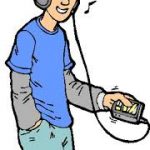2.2 Gramática: Present tense of -AR verbs
2.2 Gramática: Present tense of -AR verbs
A. The present tense in Spanish may have various definitions in English.
For example: “Yo hablo” may be translated as:
I am speaking (progressive) I speak (present tense) I do speak (emphatic)
B. The present tense of -AR regular verbs is formed by dropping the infinitive ending (-AR) and adding the following endings according to the subject:
ESTUDIAR (to study)
| Singular | Plural | ||
| Yo | estudio | Nosotros (as) | estudiamos |
| Tú | estudias | Vosotros (as) | estudiáis |
| Él, Ella, Usted | estudia | Ellos, Ellas, Ustedes | estudian |
NOTE: To make a sentence negative, put “NO” in front of the conjugated verb.
I don’t speak Spanish = No hablo español
She doesn’t travel = Ella no viaja
The following is a list of common regular -AR verbs in Spanish:
| Ayudar a | to help | Llevar | to carry; to take; to wear |
| Bailar | to dance | Mirar | to look at; to watch |
| Buscar | to look for | Montar | to ride |
| Caminar | to walk | Necesitar | to need |
| Cocinar | to cook | Pagar | to pay for |
| Comprar | to buy | Practicar | to practice |
| Contestar | to answer | Preguntar | to ask questions |
| *Desear + verb | to desire | Regresar | to return |
| Escuchar | to listen |
Tocar | to touch/to play (inst.) |
| Enseñar | to teach | Trabajar | to work |
| Hablar | to speak | Tomar | to take; to drink |
| Llamar | to call | Viajar | to travel |
| Llegar | to arrive | Visitar |
to visit |
**TERMINAR–to finish
Verb Chart. Complete the verb table.
| Hablar | Escuchar | Necesitar | Trabajar | Viajar | Llamar | |
| Yo | escucho | |||||
| Tú | trabajas | |||||
| Él, Ella, Usted (Ud.) |
llama | |||||
| Nosotros(as) | necesitamos | |||||
| Vosotros(as) | habláis | |||||
| Ellos, Ellas, Ustedes (Uds.) |
viajan |
Ejemplos:
- Yo deseo hablar español = I wish to speak Spanish.
- Mi hermana escucha música clásica = my sister listens to classical music.
- Nosotros visitamos el museo = We visit the museum.
 ACTIVIDAD # 1
ACTIVIDAD # 1
Oraciones. Gloria is explaining what everybody does on Saturday. Conjugate the verbs accordingly:
- Mi mamá / comprar comida:
- Yo / caminar en el parque:
- Mi papá / trabajar en el jardín los fines de semana :
- Mis hermanos (my siblings) / bailar:
- Mi abuela (my grandmother) / cocinar muy rico (good):
 ACTIVIDAD # 2
ACTIVIDAD # 2
Contestar. Respond to the following personal questions:
- ¿Tú trabajas o estudias?
- ¿Tú hablas portugués?
- ¿Tú miras televisión por la noche?
- ¿Tú llamas mucho por teléfono?
- ¿Tú practicas el español en tu casa?
 ACTIVIDAD # 3 Write-Pair-Share
ACTIVIDAD # 3 Write-Pair-Share
Situaciones. How would you express the following ideas in Spanish?
Use -AR ending verbs:
1. Tell a friend that you need a hundred dollars.
2. Tell your friend that your mom returns home at 6 pm.
3. Say that you and your friends walk to class.
4. Say that you work 40 hours a week.
5. Tell the class that you visit Mexico often (frecuentemente).
 ACTIVIDAD # 4
ACTIVIDAD # 4
Seleccionar. Select the appropriate verb and write a complete sentence in the present tense according to the following images:
| HABLAR TRABAJAR BAILAR VIAJAR ESTUDIAR ESCUCHAR |



1. ___________________ 2. __________________ 3. _____________________



4.__________________ 5. __________________ 6.____________________
 ACTIVIDAD # 5 Compañeros de clase
ACTIVIDAD # 5 Compañeros de clase
Paso 1. Read about two college students: Raquel and her friend Felipe.
Paso 2. After reading, complete the reading comprehension activities below.
Press play to listen to the pronunciation of the reading in the paragraph written below.

Hola amigos, me llamo Raquel Melgar. Estudio psicología en la Facultad de Humanidades de la Universidad de Madrid. Mis clases son muy temprano (early) los lunes y los miércoles. Yo camino a la universidad y llego a las ocho menos cuarto. Este semestre mis clases son arte, español, psicología y estadística. La clase de psicología es mi favorita. La clase de estadística es difícil, pero la profesora es muy buena. Por las tardes trabajo en una oficina de la universidad. |

Este es el amigo de Raquel. Se llama Ryan Smith. Estudia español en la universidad. Es norteamericano. Sus clases este semestre son literatura, matemáticas, historia, geografía y español. Muchas clases ¿verdad? Ryan está muy ocupado (is very busy) este semestre, pero es muy estudioso y saca buenas notas. Él practica español con Raquel todos los días. A las cinco de la tarde estudia en la biblioteca y después a las siete regresa a su piso (apartamento). |
¿Qué sabes de (what do you know about) Raquel? Completa:
- Las clases de Raquel son los lunes y
- Raquel toma clases.
- Su clase favorita es .
- Su clase difícil es
- Raquel trabaja en
¿Qué sabes de Ryan? Verdadero (V) o Falso (F). If false, give the correct answer.
- Ryan practica español con sus profesores
- Ryan toma cinco clases
- El apellido de Ryan es Smith
- Ryan estudia español en la universidad
- A las siete de la tarde Ryan estudia
- Ryan saca malas notas
 ACTIVIDAD # 6
ACTIVIDAD # 6
Tu agenda semanal. Complete your weekly agenda using what you learned
in lesson 2. Use complete phrases and TWO activities for each day.
Ejemplo: Lunes
TOMO dos clases A las diez de la mañana.
TRABAJO De (from) cinco a (to) ocho de la noche.
| Día de la semana | Actividades | Hora |
| Lunes | ||
| Martes | ||
| Miércoles | ||
| Jueves | ||
| Viernes | ||
| Sábado | ||
| Domingo |
Answer the following questions in complete sentences:
1. ¿Cuál es tu día favorito? ¿Por qué? (why)
2. ¿Cuál es tu día más ocupado?
 ACTIVIDAD # 7 ¡Hablemos!
ACTIVIDAD # 7 ¡Hablemos!
With a partner, take turns asking and responding in Spanish to the following questions:
Ejemplo:
E1: ¿Hablas inglés?
E2: Sí, hablo inglés (Sí, hablo un poco/ poquito)
No, no hablo inglés.
Estudiante A
1. ¿Trabajas?
2. ¿Hablas español?
3. ¿Tocas un instrumento musical?
4. ¿Compras libros en Amazon?
5. ¿Miras la tele por la noche (at night)?
Estudiante B
1. ¿Estudias español este (this) semestre?
2. ¿Escuchas música todos los días?
3. ¿Llegas tarde (late) a la clase de español?
4. En la clase de español, ¿Contestas en español o en inglés?
5. ¿Buscas palabras (words) en el diccionario?


